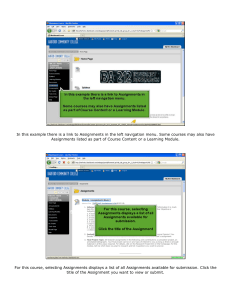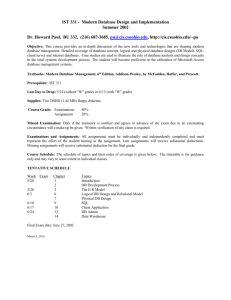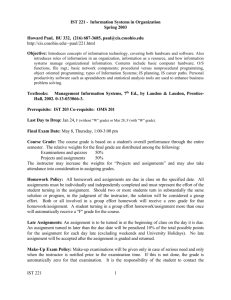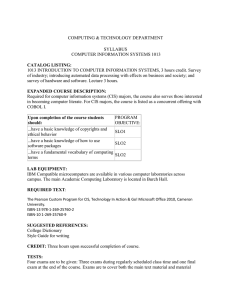Document 10520171
advertisement
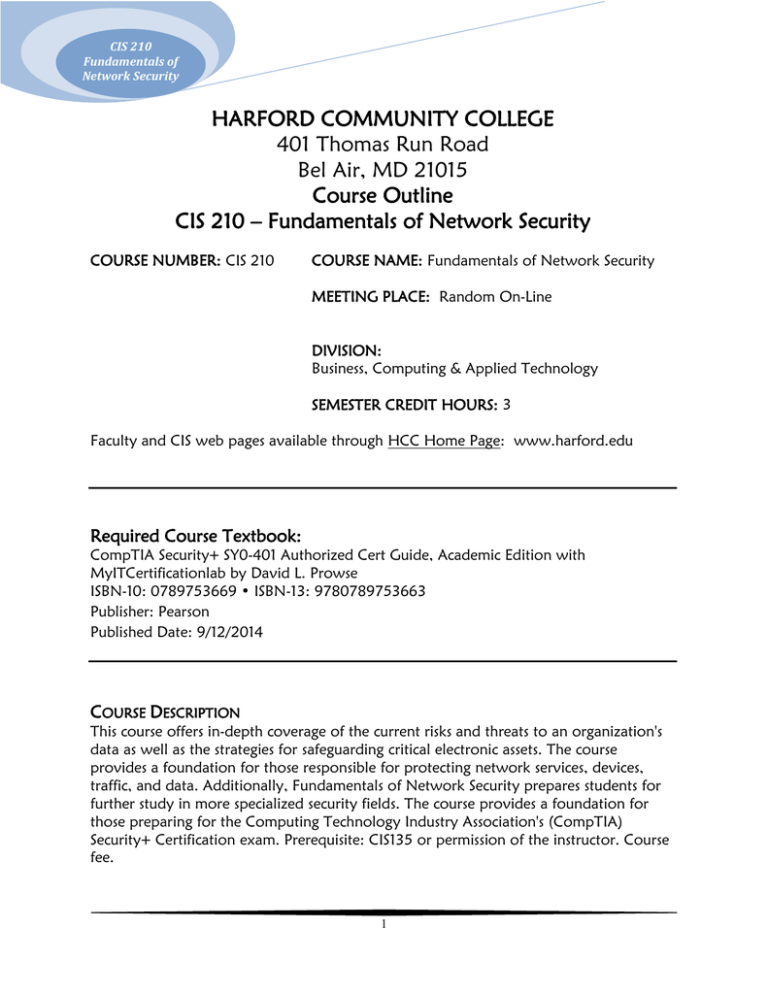
CIS 210 Fundamentals of Network Security HARFORD COMMUNITY COLLEGE 401 Thomas Run Road Bel Air, MD 21015 Course Outline CIS 210 – Fundamentals of Network Security COURSE NUMBER: CIS 210 COURSE NAME: Fundamentals of Network Security MEETING PLACE: Random On-Line DIVISION: Business, Computing & Applied Technology SEMESTER CREDIT HOURS: 3 Faculty and CIS web pages available through HCC Home Page: www.harford.edu Required Course Textbook: CompTIA Security+ SY0-401 Authorized Cert Guide, Academic Edition with MyITCertificationlab by David L. Prowse ISBN-10: 0789753669 • ISBN-13: 9780789753663 Publisher: Pearson Published Date: 9/12/2014 COURSE DESCRIPTION This course offers in-depth coverage of the current risks and threats to an organization's data as well as the strategies for safeguarding critical electronic assets. The course provides a foundation for those responsible for protecting network services, devices, traffic, and data. Additionally, Fundamentals of Network Security prepares students for further study in more specialized security fields. The course provides a foundation for those preparing for the Computing Technology Industry Association's (CompTIA) Security+ Certification exam. Prerequisite: CIS135 or permission of the instructor. Course fee. 1 CIS 210 Fundamentals of Network Security Program Goals 1. Analyze the use of commercial software applications, hardware, networks, programming, and other technologies in information systems at a level of competence appropriate to joining the workforce. 2. Use, maintain, and modify existing information systems. 3. Design and implement new information systems. 4. Demonstrate the skills to work in a business environment, including working in teams, project management, and professional effective communication with a wider audience. Student Learning Objectives (previously known as course objectives) Linked to Relevant Academic Outcomes Upon satisfactory completion of this course, the student will be able to: Upon satisfactory completion of this course, the student will be able to: 1. Identify security threats to network services, devices, traffic, and data. (Program Goal 2) 2. Secure network systems and services. (Program Goal 2) 3. Secure network communications. (Program Goal 2) 4. Analyze the characteristics of an effective organizational security policy. (Program Goal 3) 5. Monitor the security infrastructure. (Program Goal 3) GRADING STANDARDS: The final course grade is comprised of the student’s mastery of course requirements. Course grades are based upon the following total mastery level: A = 91-100% B = 81-90% C = 71-80% D = 61-70% F = 60% and below -Chapter Quizzes -Mid-Term Exam - Final Exam - Discussion Topics, Participation & Projects(Labs etc) - Introduction Posting =10% =30% =30% =29% =1% 2 CIS 210 Fundamentals of Network Security CLASS SCHEDULE FOR CIS 210 Course Outline Chapter 1 Introduction to Security I. Foundation Topics II. Security 101 III. Think Like a Hacker Chapter 2 Computer Systems Security I. Foundation Topics II. Computer Systems Security Threats III. Implementing Security Applications IV. Securing Computer Hardware, Peripherals, and Mobile Devices V. Removable Storage Chapter 3 OS Hardening and Virtualization I. Foundation Topics II. Hardening Operating Systems III. Virtualization Technology Chapter 4 Application Security I. Foundation Topics II. Securing the Browser III. Securing Other Applications IV. Secure Programming Chapter 5 Network Design Elements I. Foundation Topics II. Network Design III. Cloud Security and Server Defense Chapter 6 Networking Protocols and Threats I. Foundation Topics II. Ports and Protocols III. Malicious Attacks Chapter 7 Network Perimeter Security I. Foundation Topics II. Firewalls and Network Security III. NIDS Versus NIPS 3 CIS 210 Fundamentals of Network Security Chapter 8 Securing Network Media and Devices I. Foundation Topics II. Securing Wired Networks and Devices Chapter 9 Physical Security and Authentication Models I. Foundation Topics II. Physical Security III. Authentication Models and Components Chapter 10 Access Control Methods and Models I. Foundation Topics II. Access Control Models Defined III. Rights, Permissions, and Policies Chapter 11 Vulnerability and Risk Assessment I. Foundation Topics II. Conducting Risk Assessments III. Assessing Vulnerability with Security Tools Chapter 12 Monitoring and Auditing I. Foundation Topics II. Monitoring Methodologies III. Using Tools to Monitor Systems and Networks IV. Conducting Audits Chapter 13 Encryption and Hashing Concepts I. Foundation Topics II. Cryptography Concepts III. Encryption Algorithms IV. Hashing Basics Chapter 14 PKI and Encryption Protocols I. Foundation Topics II. Public Key Infrastructure III. Web of Trust IV. Security Protocols Chapter 15 Redundancy and Disaster Recovery I. Foundation Topics II. Redundancy Planning III. Disaster Recovery Planning and Procedures 4 CIS 210 Fundamentals of Network Security Chapter 16 Policies, Procedures, and People I. Foundation Topics II. Environmental Controls III. Social Engineering IV. Legislative and Organizational Policies V. Summary of Personnel Security Policies COURSE POLICIES: HCC students are bound by the academic policies outlined in the most current HCC Catalog*. It is the student’s responsibility to review these policies prior to the start of each semester. INSTRUCTIONAL METHODS: To achieve student learning objectives, instruction includes lecture/demonstration, discussion, cooperative learning, and lab assignments. ATTENDANCE AND PARTICIPATION: Regular and punctual attendance is required of all students. In the case of absence due to emergency (illness, death in the family, accident), religious holiday, or participation in official College functions, it is the student's responsibility to confer with the instructor about the absence and missed course work. Since the majority of assignments are to be completed and/or discussed online, it is the student’s responsibility to regularly log into Blackboard to make sure all activities and due dates are adhered to. Exams: Mid-term and Final Exams will be completed during the semester. Each exam covers a specific set of chapter of the course textbook and is worth 60% of the overall course grade. All exams must be completed on the course website. Each online exam will be available to students for an eighteen (18) hour period (6 AM to 11:59 PM Eastern Time) on the date specified in the class schedule. The exams will no longer be available once this time period ends. Each quiz consists of multiple choice and matching questions. Exam makeups are not permitted. DISCUSSION TOPICS RESPONSES: Two discussion topic question sets will be posted for each course textbook chapter in the website “Discussion Forum” area. Students are required to provide detailed and thorough responses to each set of discussion topic questions. 5 CIS 210 Fundamentals of Network Security DISCUSSION TOPIC PARTICIPATION: Students are also required to provide a minimum of two substantive responses to fellow student postings in each discussion topic area. Substantive responses must be based upon course content, theory or personal experiences…not mere opinion. A simple “I agree” or “Great posting” will not count as a substantive response. Substantive responses should also include appropriate documentation and/or citations. STUDENT BEHAVIOR: Students will be familiar with and adhere to the “Code for Student Rights, Responsibilities and Conduct”, which can be found on OwlNet under the My Academic Life Tab or in the HCC online catalog. The Code outlines prohibited conduct, the disciplinary process, and possible sanctions. Students found responsible for violating the Code will have a disciplinary record that will remain in the Office of the Associate Vice President for Student Development for three years. DISABILITY SUPPORT SERVICES: HCC is committed to serving students who have documented physical, learning, psychological, or other disabilities. Students who have a disability are responsible for contacting Disability Support Services at 443-412-2402 to discuss their needs and establish eligibility for services and reasonable accommodations. Because accommodations can take time to implement, if you have not already contacted DSS you should do so immediately. All information shared with Disability Support is kept in accordance with relevant state and federal laws. COMPUTER ETHICS: Each student is responsible for knowing the college's policy relating to ethical behavior regarding all intellectual property and in using the computer. Copying or using anthers work, including computer files, is both illegal and unethical. See the Student Handbook. ACADEMIC DISHONESTY: Students will be familiar with and adhere to the policy governing academic dishonesty and its sanctions as outlined in the Code for Student Rights, Responsibilities and Conduct, which can be found on OwlNet under the My Academic Life Tab or in the HCC online catalog. Students who commit acts of academic dishonesty (e.g., cheating, fabrication, facilitating academic dishonesty, and plagiarism) will be subject to formal disciplinary action and will receive a grade of F on the test, quiz, or assignment involved and, at the discretion of the instructor; the student may receive an F for the course. This includes incidents that occur 6 CIS 210 Fundamentals of Network Security in the Test and Assessment Center. In addition, the student will be referred to the Associate Vice President for Student Development for a Student Code Violation. SYLLABUS MODIFICATION: The instructor reserves the right to modify and/or change the course syllabus with reasonable notification to students. COURSE REQUIREMENTS: Regular Punctual Attendance, Lab Assignments, Periodic Quizzes, Midterm Exam, Class & Homework Assignments & Final Exam STUDENT RESPONSIBILITIES Students are responsible for completing all reading and writing assignments by the scheduled due dates. Because effective writing usually comes through thoughtful revision, students should revise and edit all work before submission. Students will be given the opportunity to revise some assignments for a potentially higher grade. To pass this course, students must complete all assignments, revise and correct them as directed, and maintain a folder or portfolio of course work. At the end of the semester, students will submit this folder to the instructor. The instructor will keep folders until the deadline for grade appeal. Students are responsible for recognizing and accepting that when they put their name on any piece of work they are taking a vow that the work is theirs alone. Academic dishonesty of any form is unacceptable. Students are responsible for reading, discussing, and revising their work. Students are responsible for providing thoughtful peer evaluation. Student participation is crucial in this course and will be evaluated as part of your grade. Much of our work in class will be collaborative. It is therefore particularly important that all of your work be completed on time. You will handicap not only yourself but your classmates if you are not prepared. MAKE-UP POLICY: PLEASE READ CAREFULLY! Midterm and Final Exams: There will be no make-up exams except through arrangement with the instructor prior to the exam (and then only for reasons deemed valid enough to require the making-up of a new exam, which may be more difficult.) CLASS PROJECTS AND ASSIGNMENTS: All reading assignments (lecture notes and course textbook) must be completed during the week in which the applicable material is covered. 7 CIS 210 Fundamentals of Network Security DUE DATES: To receive full credit, all assignments must be handed in by the due date. An assignment will be accepted up to one week late and points will be deducted as follows: 1. One week late: 1/2 of overall points. 2. Thereafter, 0 points No assignment will be accepted after that. It is the student's responsibility to justify any absences and make up all assignments. INCLEMENT WEATHER: If any classes have to be canceled, tests will be rescheduled for the next class period; assignments will be collected during the next class period. College Weather Number: 443-412-2322. 15-Week Course Outline **** ALL assignments and Lab Exercises will be assigned by the Instructor. Week Introduction Lab Exercises Chapter To be assigned Assignment Due Date N/A Exam Due Date Introduction to Security Computer Systems Security 1 2 OS Hardening and Virtualization Application Security 3 4 Quiz 1 Network Design Elements Networking Protocols and Threats 5 6 Quiz 2 Network Perimeter Security Securing Network Media and Devices 7 8 Midterm Midterm Physical Security and Authentication Models Access Control Methods and Models 9 10 Vulnerability and Risk Assessment Monitoring and Auditing 11 12 8 Quiz 3 CIS 210 Fundamentals of Network Security Encryption and Hashing Concepts PKI and Encryption Protocols 13 14 Redundancy and Disaster Recovery Policies, Procedures, and People 15 16 Final Exam Quiz 4 Final Exam HARFORD COMMUNITY COLLEGE STUDENT SERVICES Please refer to the following: Go to Owlnet, My Academic Life Tab main page , top right under Quick Links - right under “Ask for Assistance” Click on Link the Student Services Hours & Locations http://www.harford.edu/studentservices/docs/Student_Services.pdf E. Federal Credit Hour Definition Statement: For a 15 week semester, each credit hour represents one hour of classroom or direct faculty instruction and a minimum of two hours of outside class-work per week. For terms that are less than 15 weeks, students should also spend a minimum of two hours outside of class for every hour in class. Academic activities include, but are not limited to reading, writiing, studying, research, and completing worksheets. In addition, at least an equivalent amount of out of class work is required for laboratory work, internships, practica, studio work, etc. At Harford Community College, for all credit courses, students are expected to spend a minimum of 37.5 combined hours of direct instructional time and related coursework time per credit hour. This course is a 3 credit course. This course achieves the minimum of 112.5 hours of combined instructional time by requiring 37.5 hours of direct instructional time and 75 hours of student work outside of direct instructional time. 9
